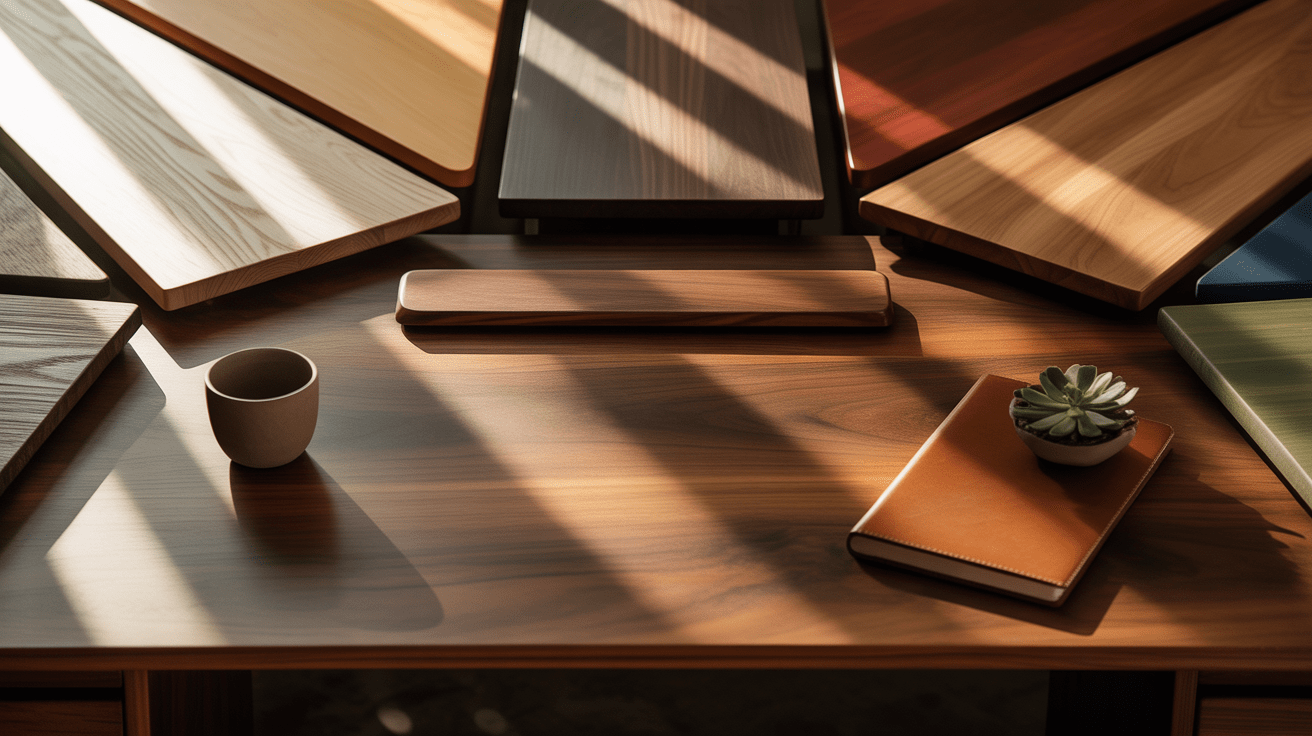Tired of workspace disappointment? Your desk material choice today could be your productivity obstacle tomorrow. That’s why selecting the right wood matters more than following fleeting design trends.
Find workspaces with desks that have maintained their appeal and functionality for decades, as they all share a secret foundation of never-dated materials.
From rich walnut to versatile oak, these enduring choices transcend office fads and seasonal shifts. They’re investment-worthy decisions that enhance your work environment regardless of changing preferences.
Ready to find the perfect wood that won’t leave you regretting your decision five years from now? These desk material options have stood the test of time for good reason.
Why Quality Desk Woods Matter?
A wooden desk is a true investment for your workspace that keeps its value. While trends may shift, quality wood remains in demand no matter which type you choose.
The beauty of lasting options is in how they stay useful and appealing across many years of changing design likes.
Picking a quality wood means:
- You won’t need a new desk when trends change
- Your workspace stays professional-looking
- You can update the office style without replacing your desk
- You build a base that fits with any style changes
- You skip the outdated look that trendy options will get
Time-Tested Favourites: Traditional Desk Woods
These widely used hardwood options provide a versatile foundation for any workspace design while maintaining enduring appeal across changing trends.
1. Oak Wood
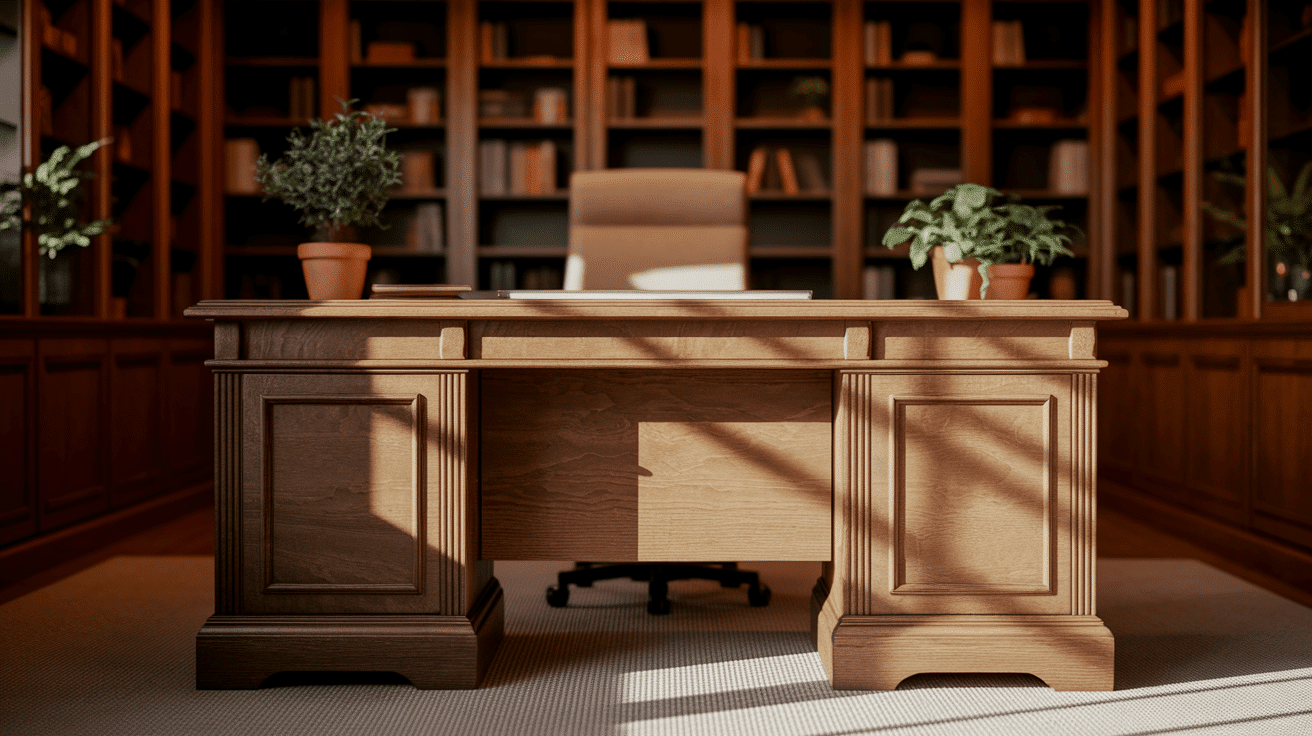
Oak showcases distinctive grain patterns while providing exceptional durability that withstands decades of daily use. This classic hardwood has graced everything from the Oval Office to home workspaces, proving its universal appeal.
The pronounced open grain creates visual interest without overwhelming the space, while its remarkable density resists dents and scratches.
2. Maple Wood
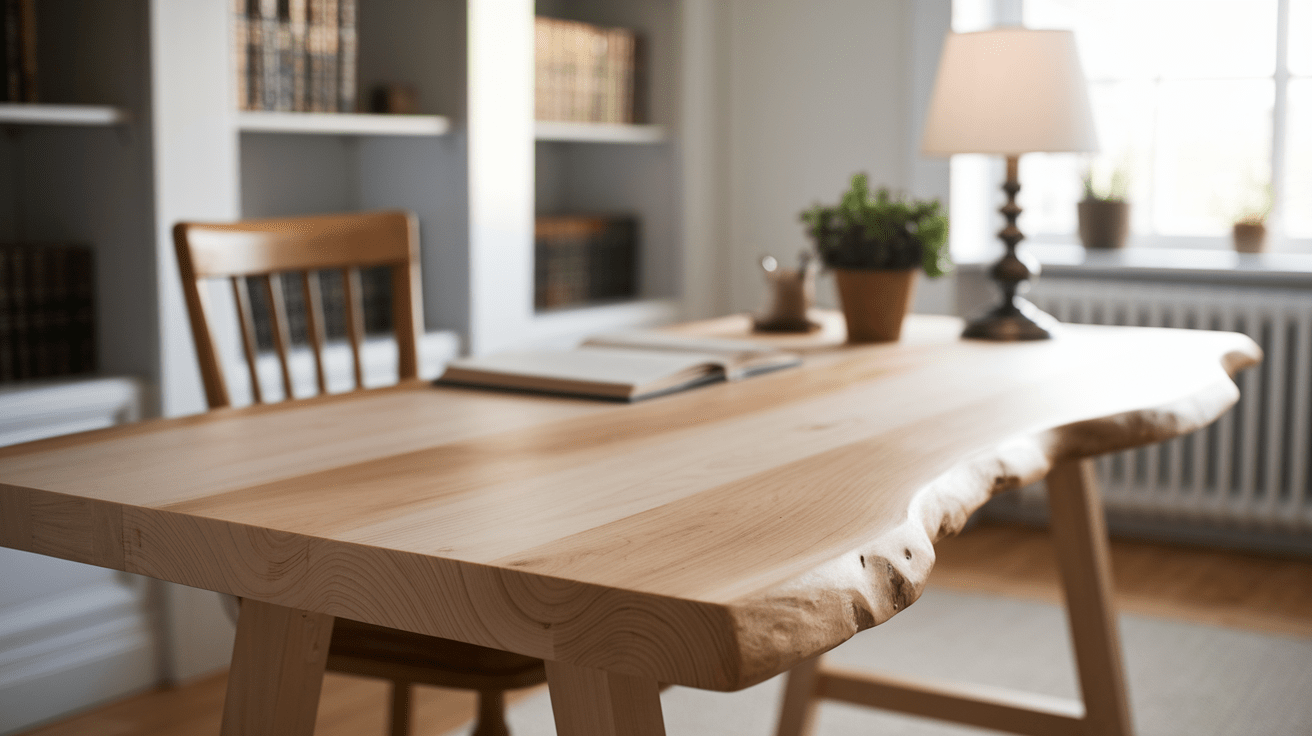
Maple wood delivers exceptional durability and a clean aesthetic that complements any workspace design. Its fine-grain pattern and light color create a bright, professional atmosphere that’s never overwhelming.
The wood’s versatile appearance adapts beautifully to both modern minimalist setups and more traditional office environments.
3. Walnut Wood
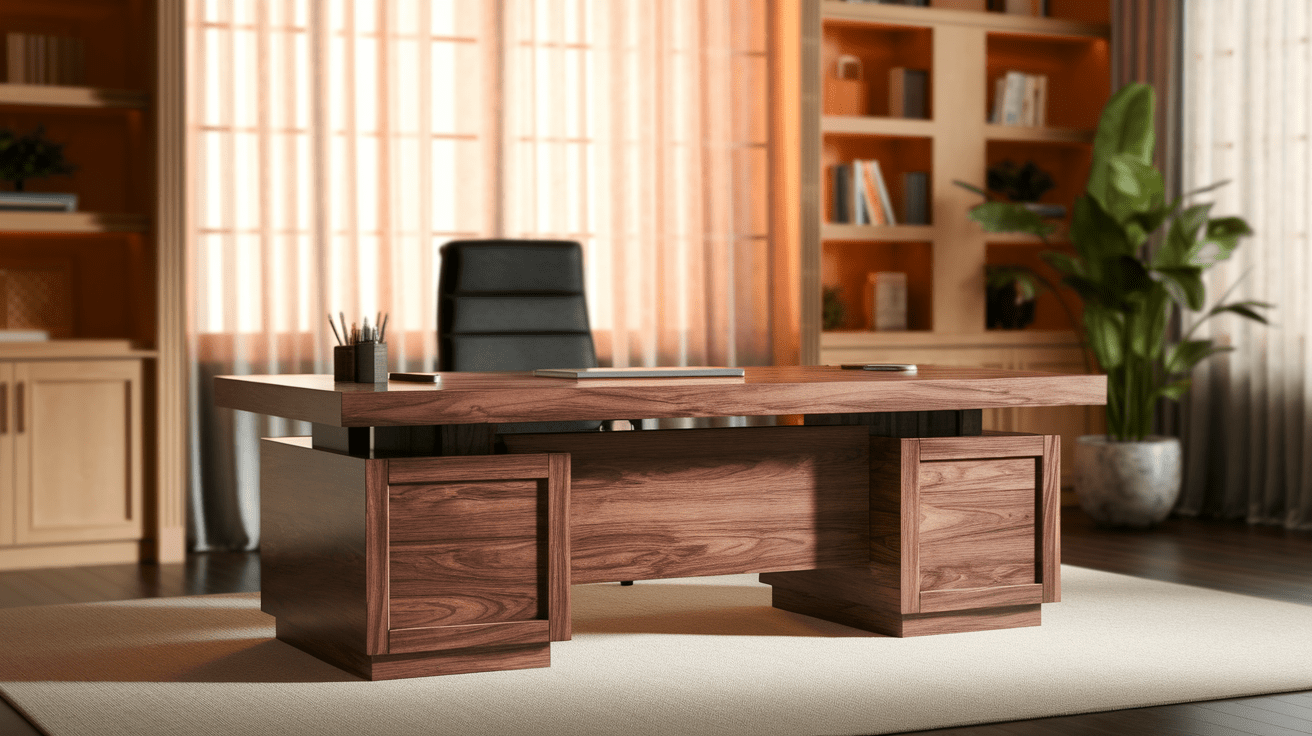
Walnut offers rich, chocolate-brown tones that exude sophistication and eternal appeal. This premium hardwood has graced executive desks for centuries, establishing immediate credibility in any workspace.
The distinctive grain patterns and depth of color create visual interest without overwhelming your office design.
4. Cherry Wood
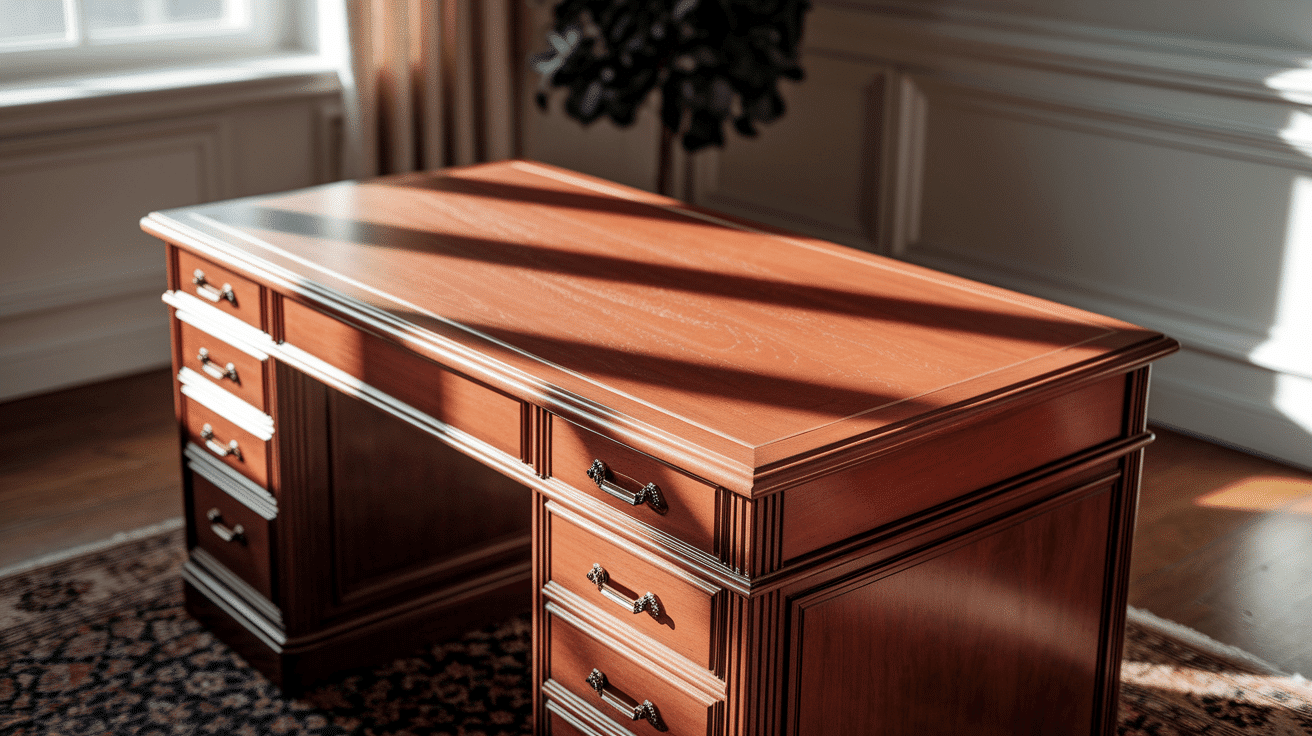
Cherry wood brings natural warmth and grace to any desk with its distinctive reddish-brown hue. This premium hardwood develops a rich patina over time, becoming more beautiful with age rather than dated.
The wood’s lustrous appearance creates an instant sense of refinement in executive offices and home workspaces alike. Its balanced tone strikes the perfect note between professional authority and inviting warmth.
These popular hardwoods offer the perfect balance of versatility and eternal grace, ensuring your workspace remains stylish for years to come.
Executive Selection: Premium Desk Materials
These high-end wood options convey authority and refinement, perfect for creating distinguished workspaces that command respect.
5. Mahogany Wood
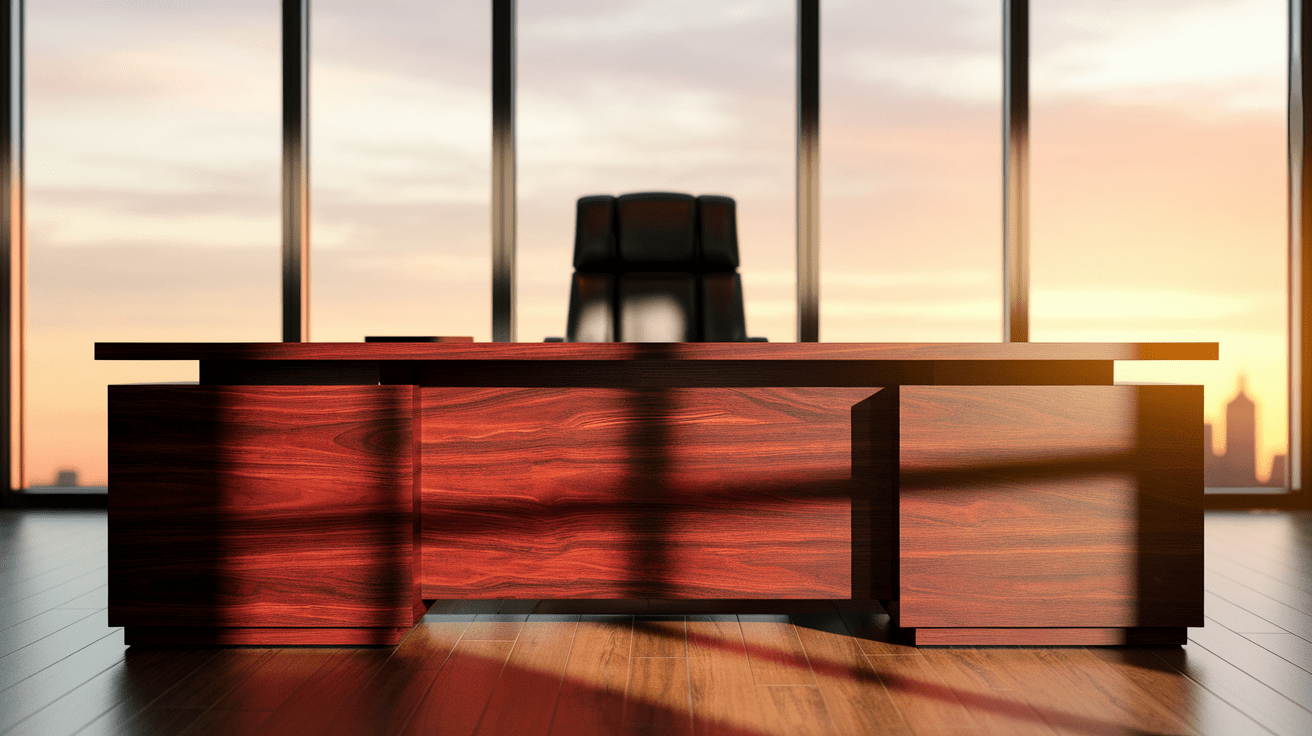
Mahogany brings centuries of tradition to any desk with its distinctive reddish-brown color and exceptional durability.
This legendary hardwood has been the material of choice for fine furniture makers across generations. The wood’s straight grain and subtle luster create an understated grace that never goes out of style.
6. Teak Wood
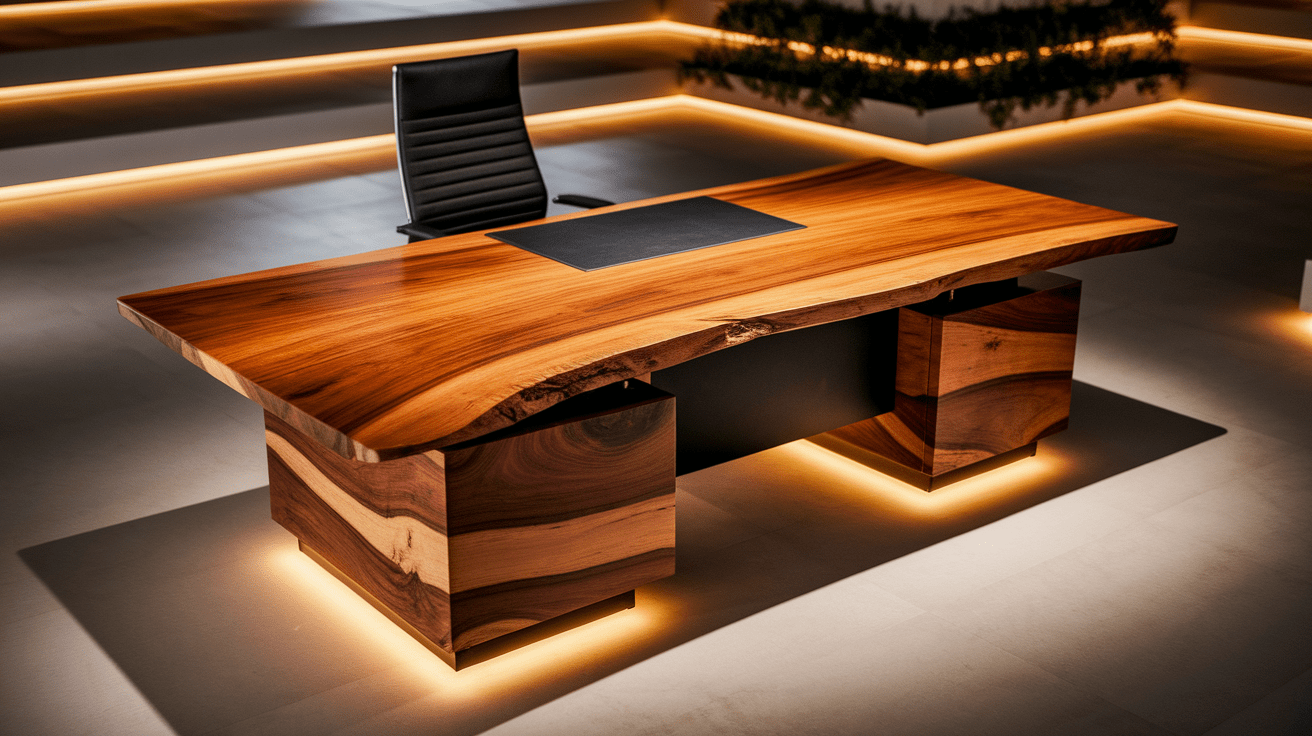
Teak offers exceptional durability with its natural oils that resist moisture and wear over decades of use. This golden-brown hardwood has been trusted for maritime applications for centuries, making it impervious to the challenges of daily office use.
The wood’s straight grain and silky texture create a refined yet approachable appeal that works across design styles.
7. Birch Wood
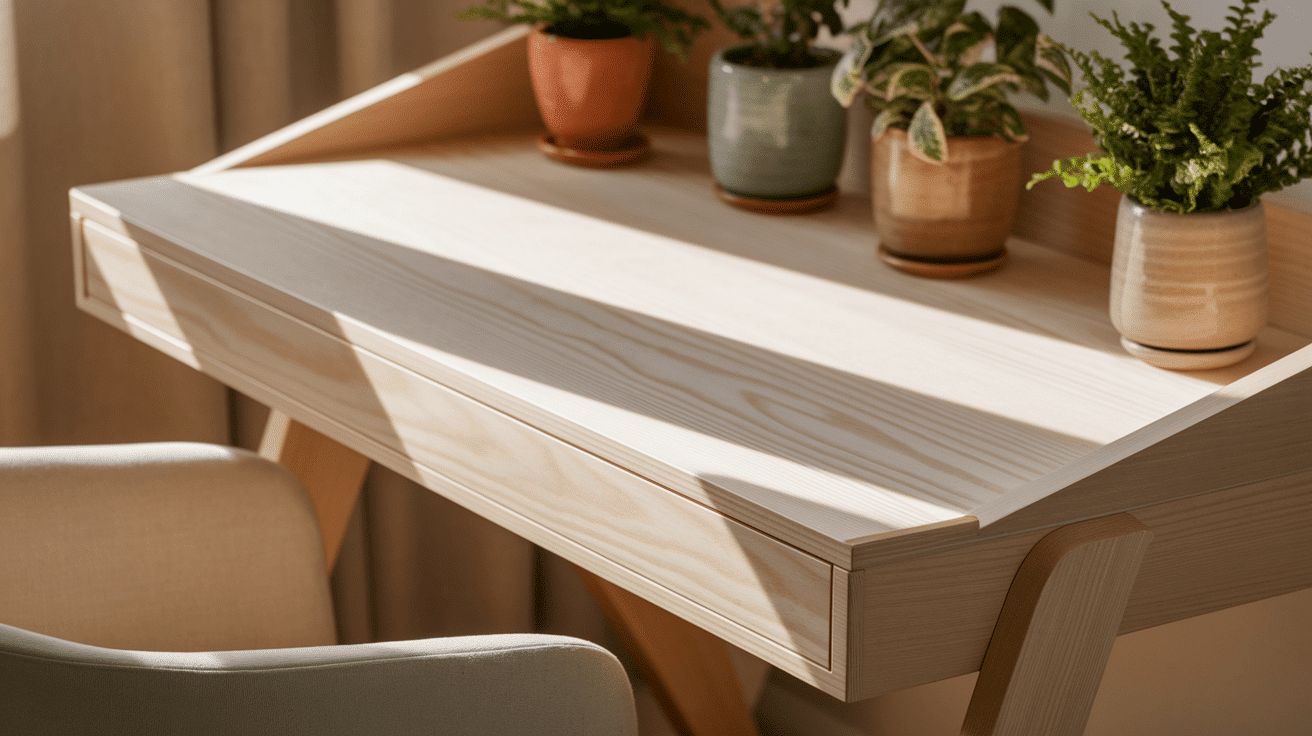
Birch delivers exceptional value with its light, uniform appearance and impressive structural stability. This hardwood offers a clean canvas for both natural finishes and custom stains to match any office aesthetic.
The wood’s fine, even texture creates a consistent surface that’s ideal for writing and detailed work.
8. Ash Wood
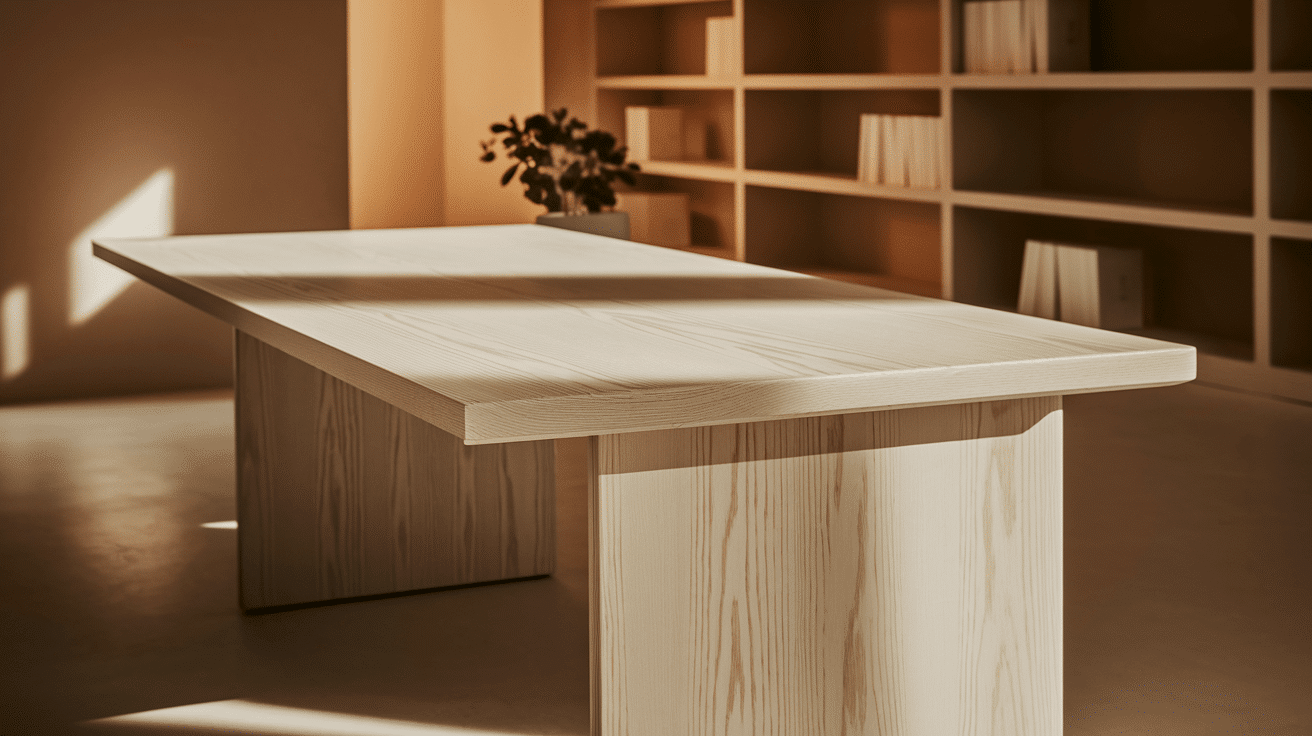
Ash provides an outstanding strength-to-weight ratio, creating substantial desks that remain easy to reposition. This distinctive hardwood features beautiful grain patterns similar to oak but with a lighter, more contemporary feel.
The wood’s excellent shock resistance makes it ideal for active work environments where desks see varied use.
These premium hardwoods create an atmosphere of achievement and permanence, perfect for spaces where important decisions are made.
Budget-Friendly Performers: Practical Desk Options
Reliable, accessible wood options that balance quality with value, ideal for creating functional desks that withstand daily use.
9. Beech Wood
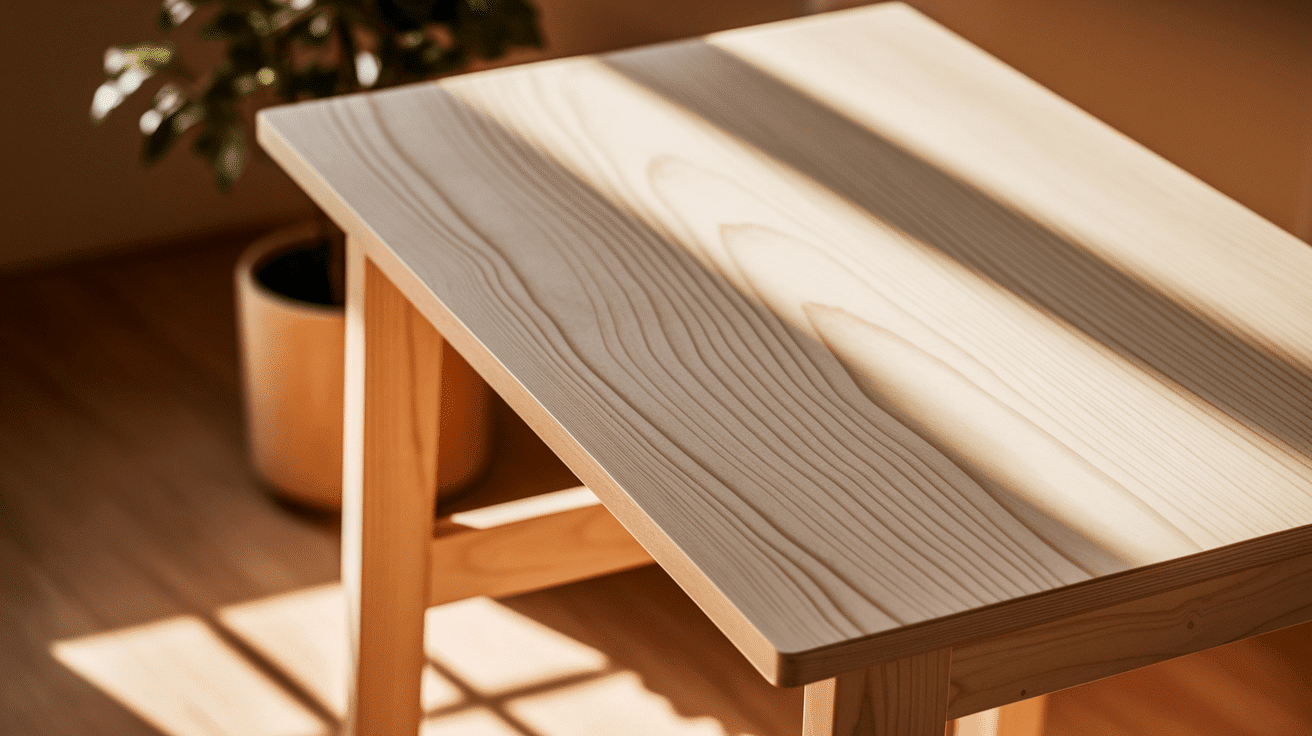
Beech offers remarkable density and a tight grain pattern that creates a smooth, consistent surface. This European hardwood provides excellent value while maintaining the quality appearance expected in professional settings.
Many furniture makers choose beech for its exceptional machinability, allowing for precise detailing in custom desk designs.
10. Pine Wood
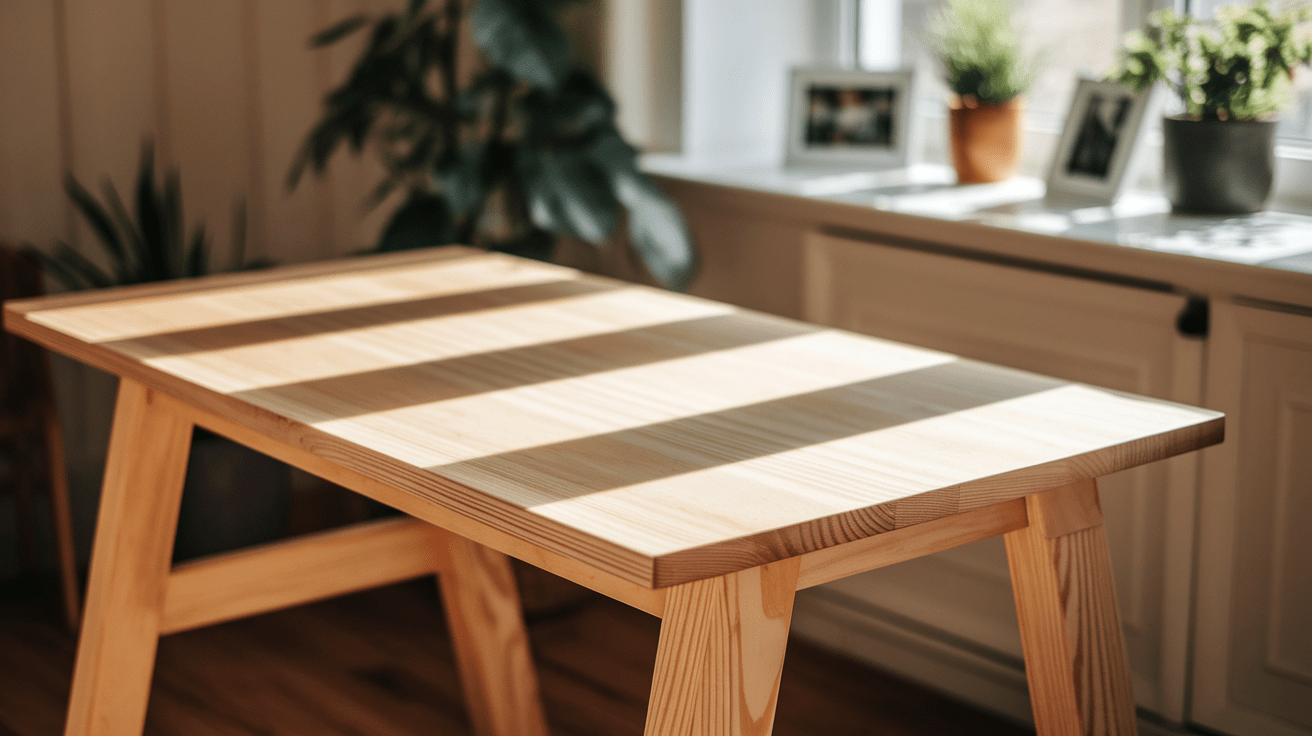
Pine brings natural warmth and accessibility to any workspace with its distinctive knots and golden color. This softwood allows for custom desk solutions at approachable price points without sacrificing character.
The wood’s inviting appearance creates an instantly comfortable atmosphere in home offices and creative spaces.
11. Rubberwood
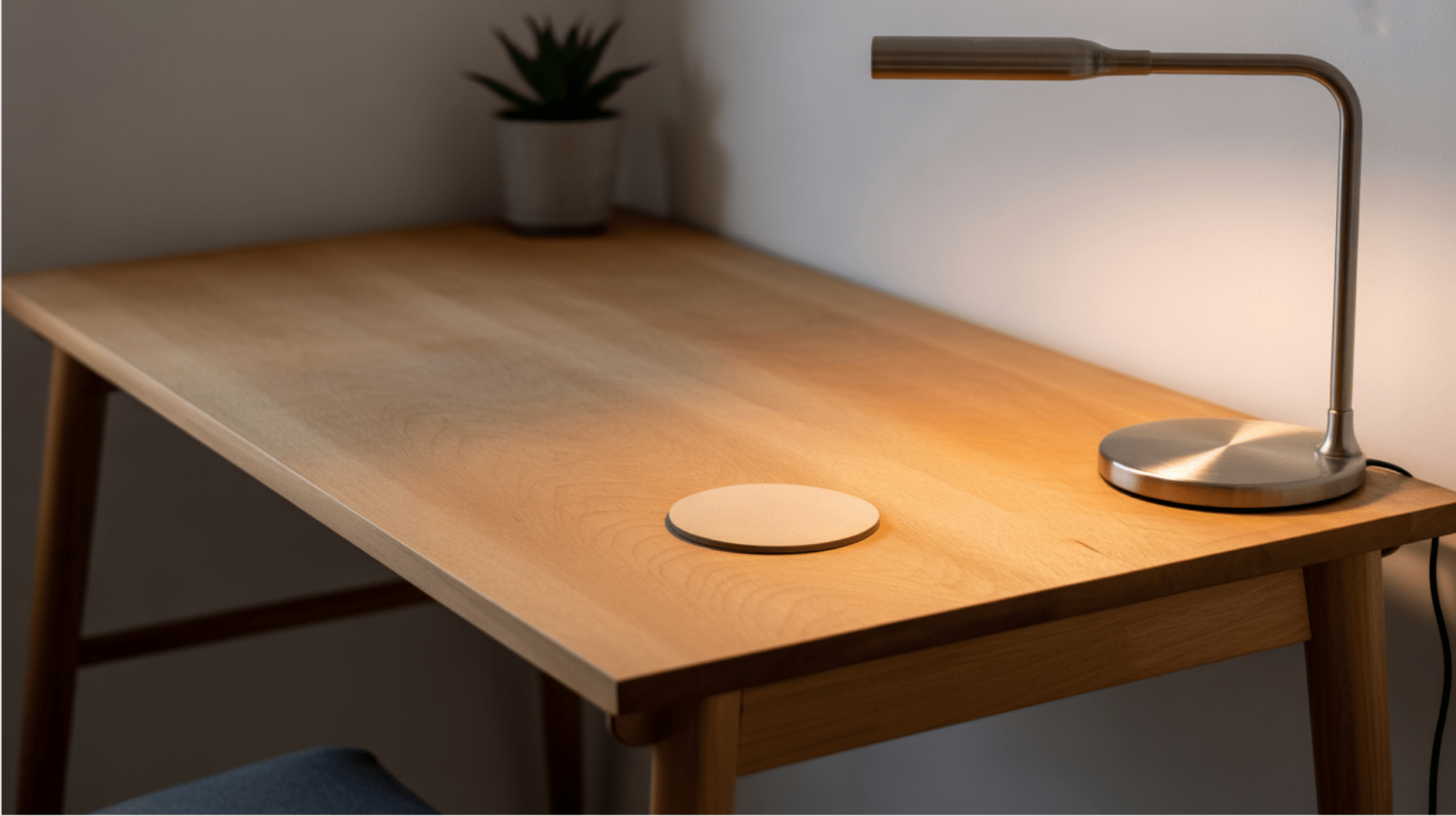
Rubberwood offers remarkable sustainability as a by-product of latex production that would otherwise be discarded. This hardwood provides exceptional value while delivering performance comparable to traditional furniture woods.
Many furniture manufacturers select rubberwood for its environmental benefits and its ability to accept finishes that transform its appearance to match diverse design preferences.
12. Bamboo Material
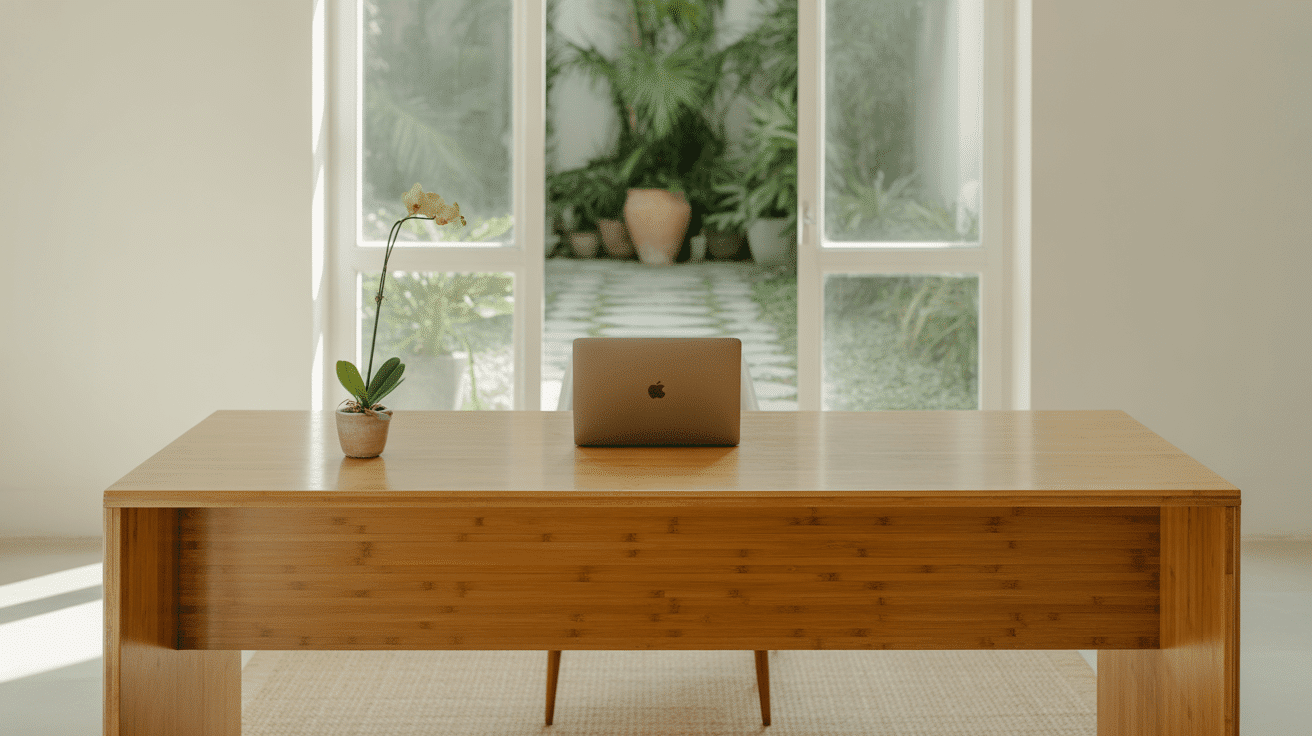
Bamboo offers exceptional sustainability credentials with its rapid growth cycle and minimal environmental impact. This grass species provides hardwood-like performance while appealing to eco-conscious professionals.
The material’s distinctive appearance features characteristic nodes that create visual interest without overwhelming modern workspaces.
These practical woods deliver reliable performance for everyday work environments without compromising on quality or appearance.
Statement Makers: Distinctive Desk Surfaces
Unique wood options that make bold statements while remaining functionally excellent, ideal for creating desks with personality and presence.
13. Acacia Wood
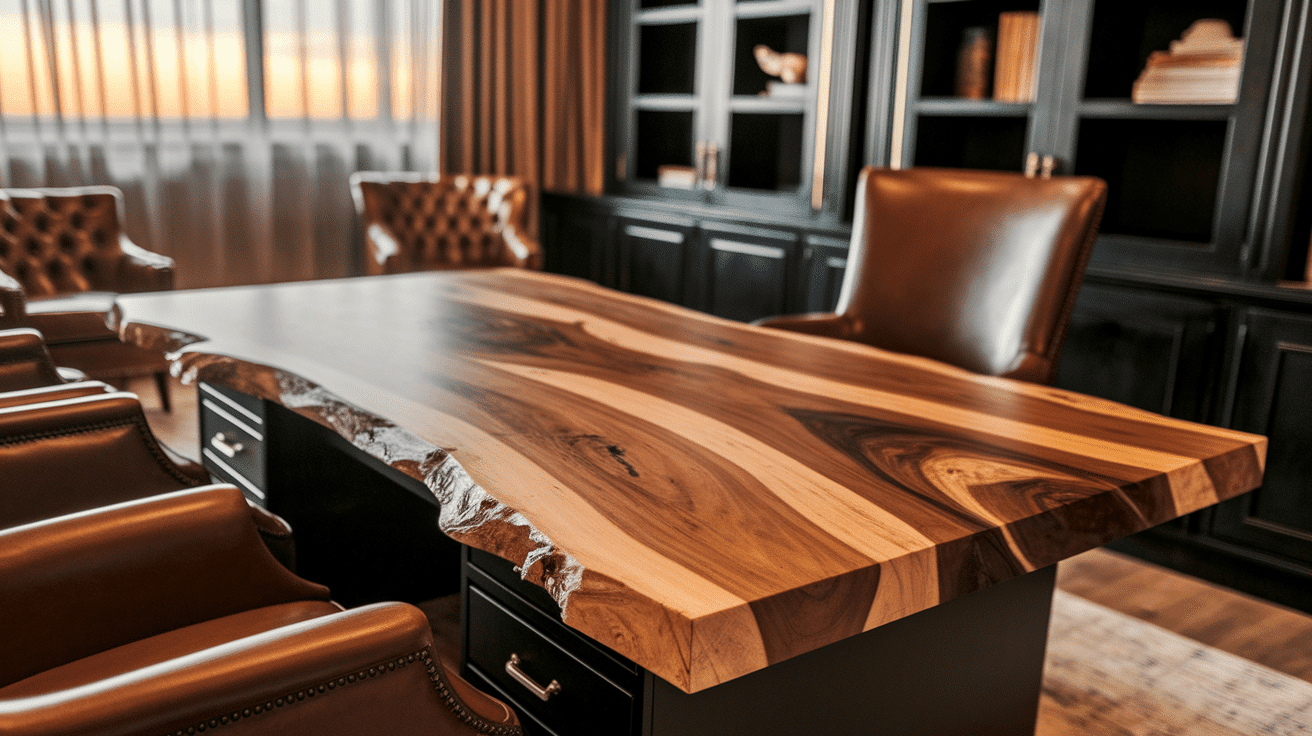
Acacia delivers striking grain patterns and rich color variations that create statement-making desk surfaces. This hardwood’s natural durability makes it ideal for busy workspaces where aesthetics cannot compromise functionality.
The wood’s varied appearance ranges from golden brown to deep amber, adding organic beauty to modern office designs.
14. Reclaimed Wood
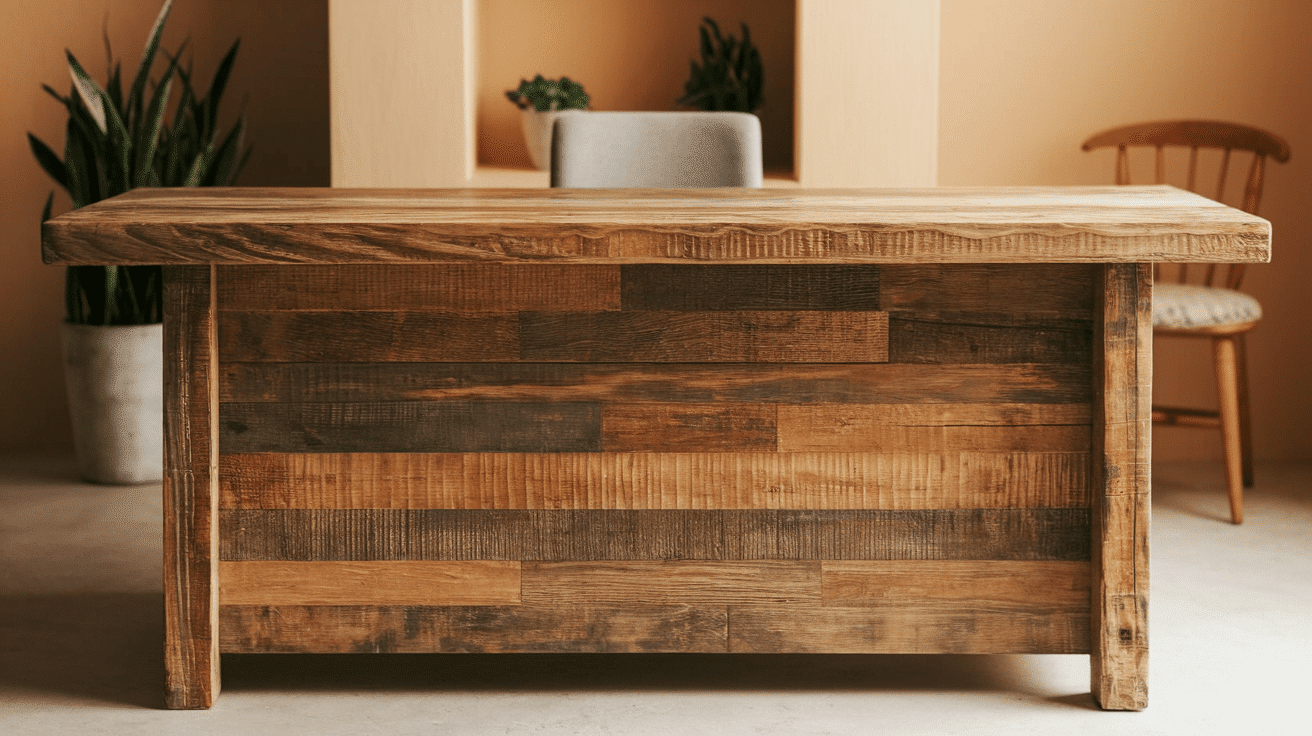
Reclaimed wood tells a unique story through its weathered appearance and historical significance. These repurposed materials bring character and sustainability to desk designs that simply cannot be replicated with new lumber.
Many creative professionals select reclaimed wood for its connection to history and its ability to add warmth to otherwise minimal contemporary environments.
15. Live Edge Wood
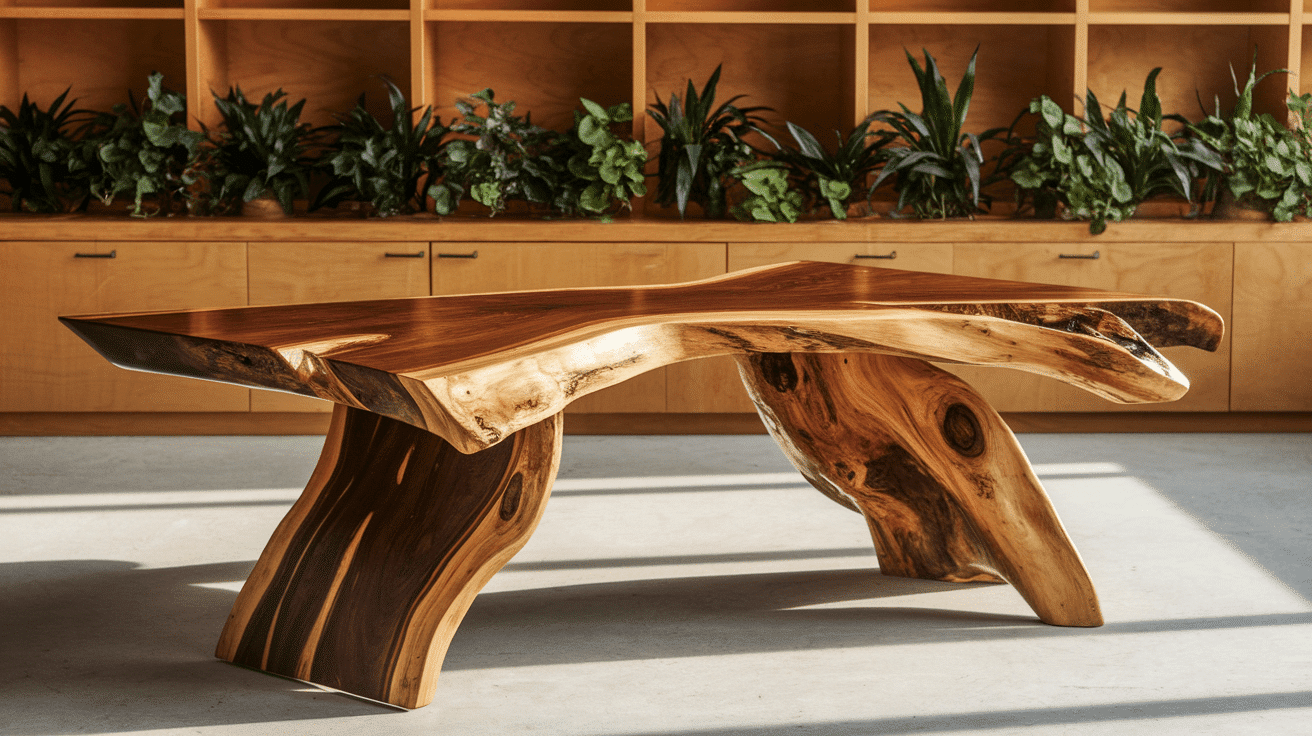
Live edge slabs preserve the natural contours of the tree, creating organic desk surfaces that connect workspaces to nature. This distinctive approach to desk construction showcases the raw beauty of wood in its most orignal form.
The natural edge creates a striking contrast with the refined, finished surface where actual work occurs.
16. Sapele Wood
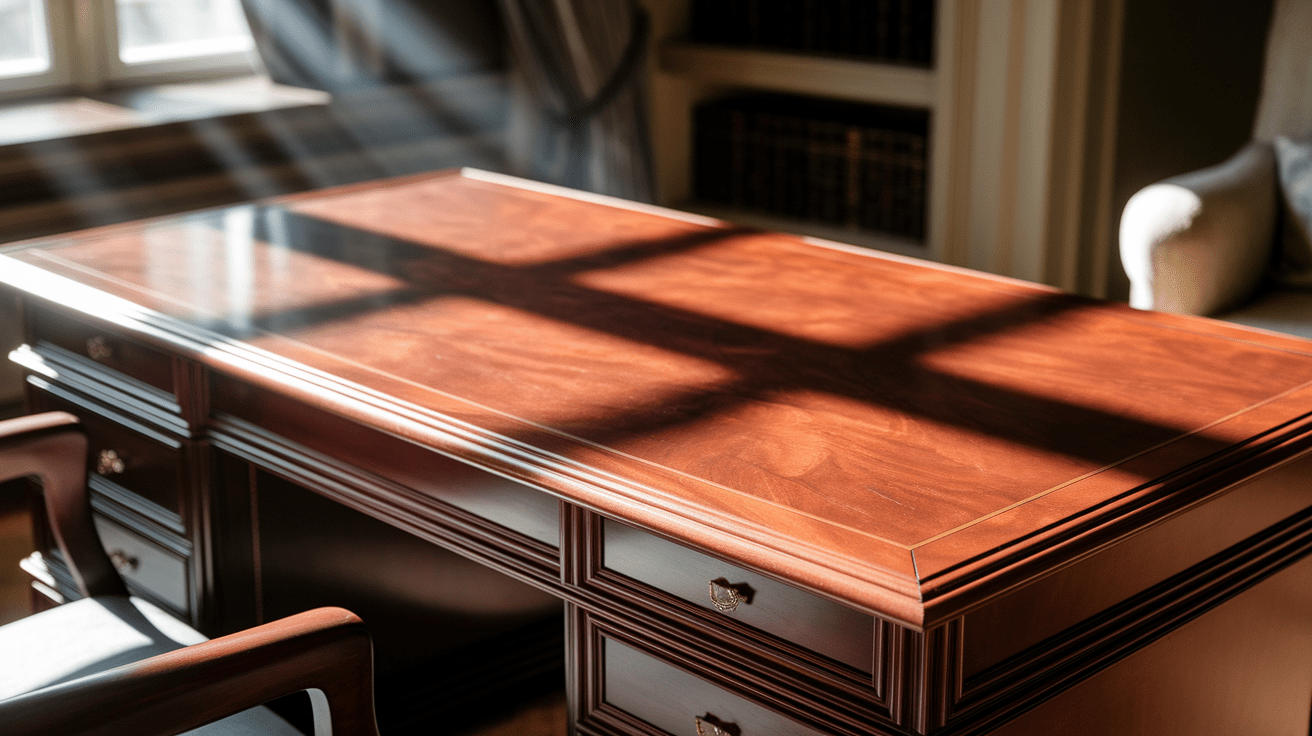
Sapele brings mahogany-like grace with its reddish-brown coloration and distinctive interlocked grain pattern. This African hardwood offers a premium appearance at a more accessible price point than true mahogany.
Design professionals select sapele for its exceptional durability and sophisticated appearance that exalts any workspace.
These distinctive woods allow professionals to express individual style through desks that command attention while providing excellent functionality.
Luxury Selections: Rare and Exotic Desk Materials
Rare and distinctive wood options that create truly exceptional desks, perfect for those seeking the ultimate in uniqueness and luxury.
17. Zebrawood
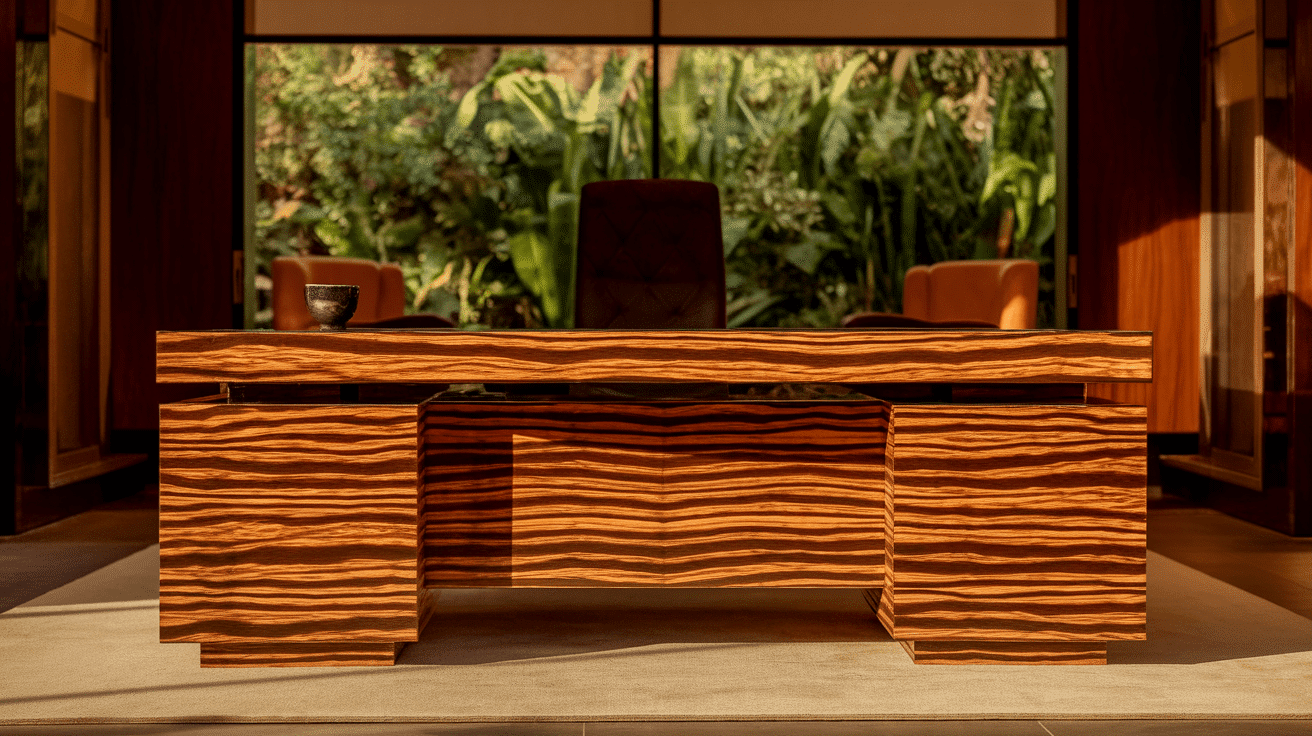
Zebrawood showcases dramatic striped patterns that immediately catch the eye and establish a distinctive workspace.
This exotic hardwood brings natural artistry to desk surfaces without requiring additional decoration. The wood’s contrasting light and dark bands create movement across expansive desk surfaces.
18. Purple Heart Wood
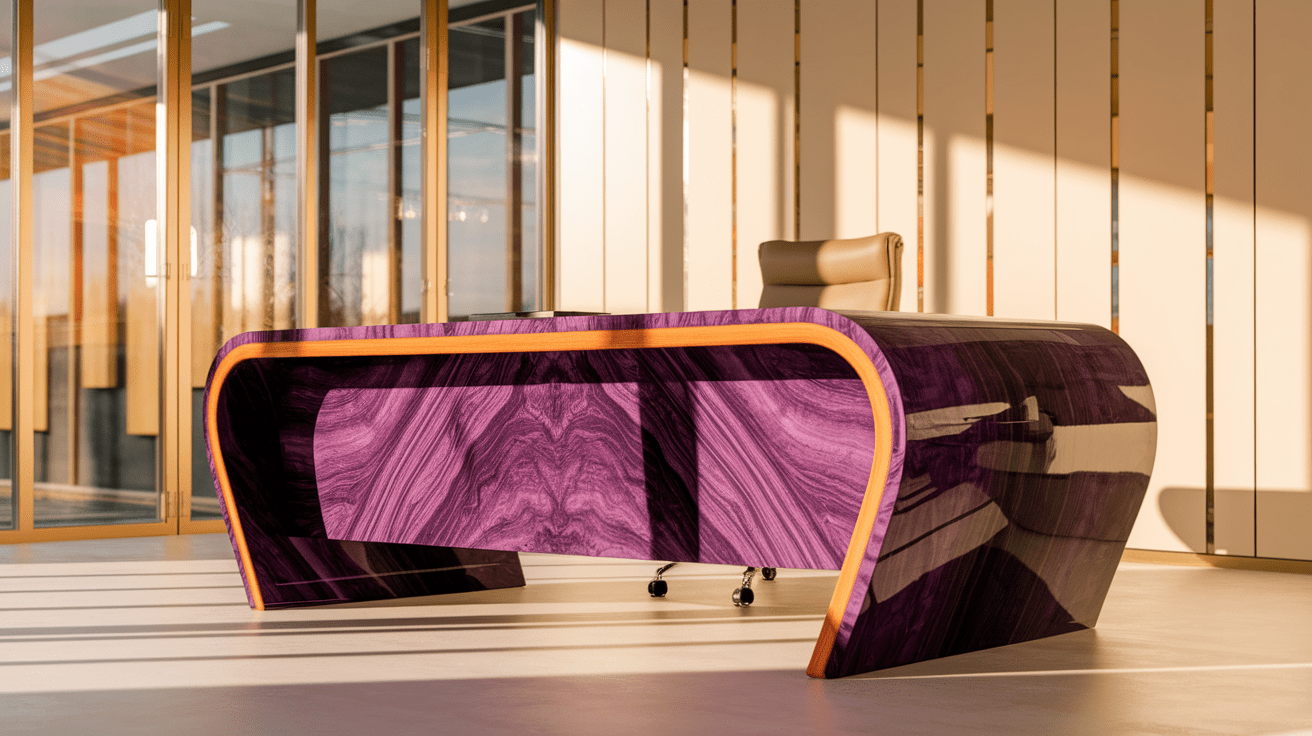
Purple Heart delivers a truly unique color palette with its distinctive natural purple hue that deepens with age.
This exceptional hardwood creates desks that appear almost artificially colored despite being completely natural. The wood’s remarkable density and strength ensure longevity that matches its visual impact.
19. Ebony Wood
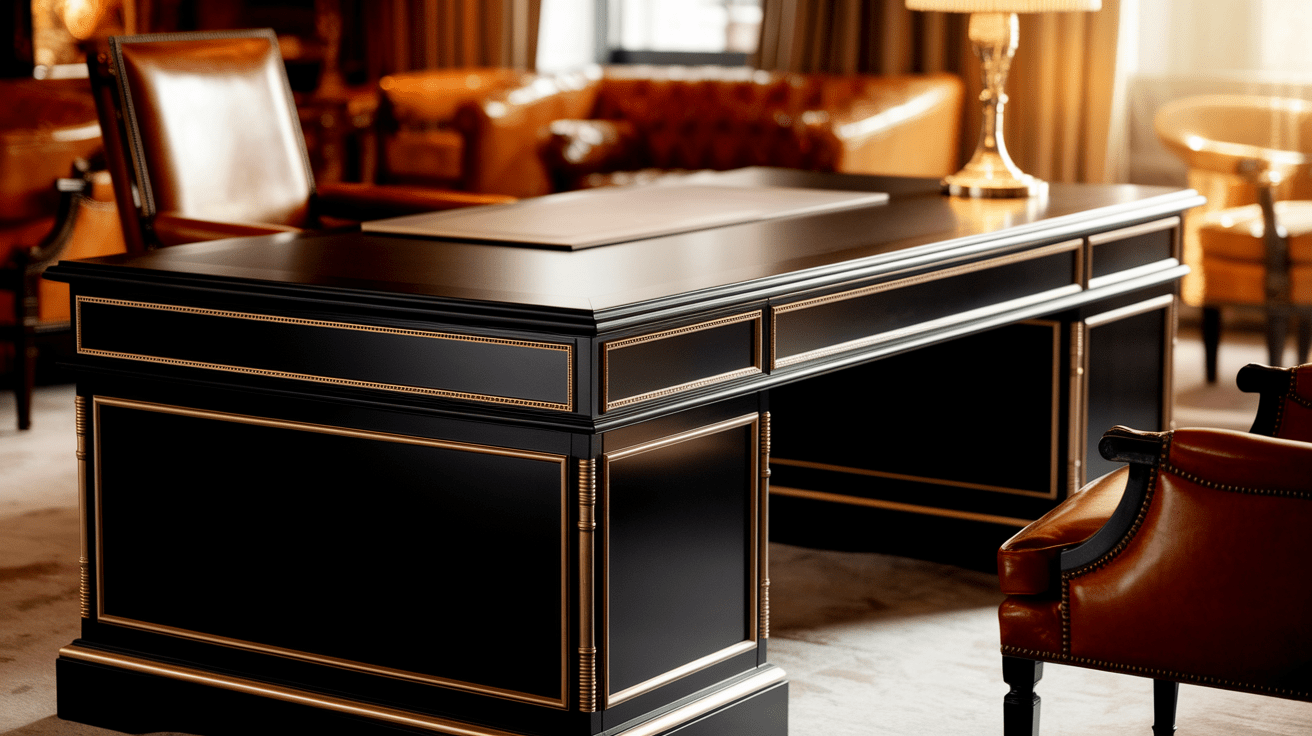
Ebony delivers unmatched sophistication with its nearly black appearance and remarkable density. This rare, luxury hardwood makes an unmistakable statement in any executive office or premium workspace.
The wood’s fine texture and lustrous finish create a sense of exclusivity that’s impossible to replicate.
20. Rosewood
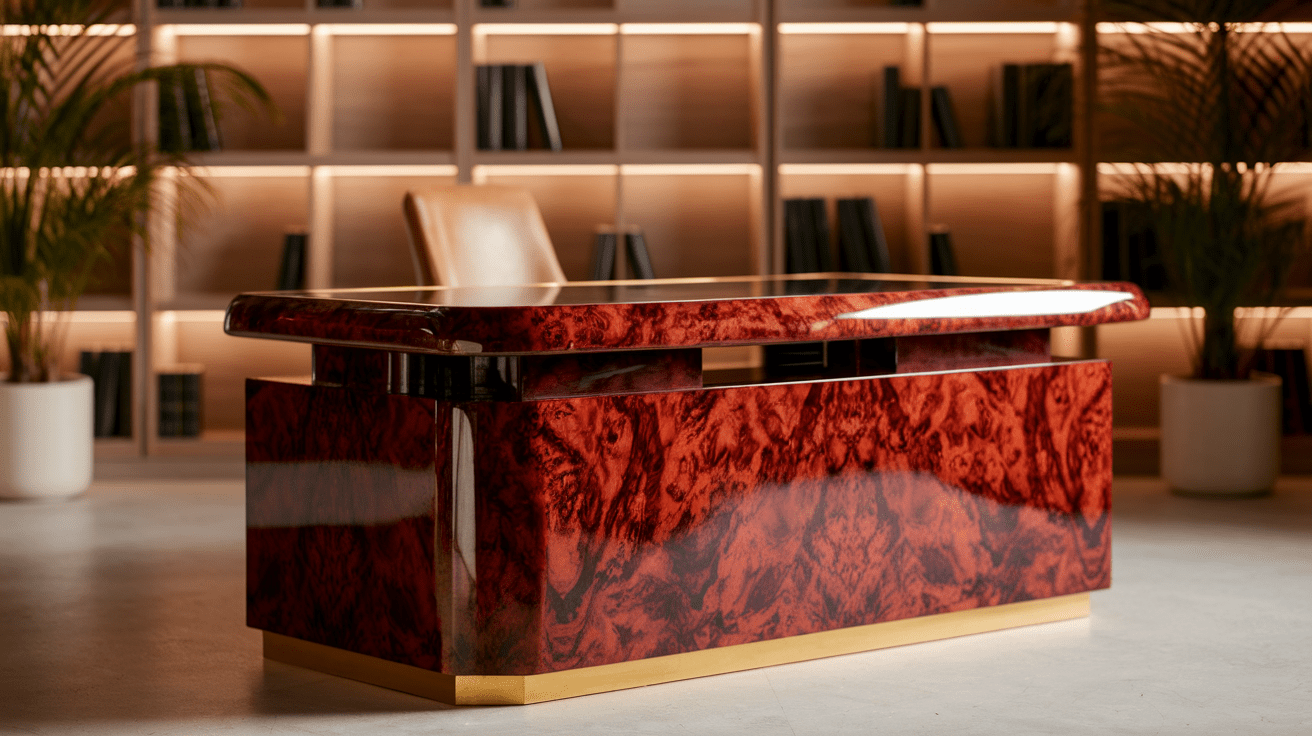
Rosewood showcases striking color variations from deep burgundy to rich brown with distinctive darker veining.
This exotic hardwood brings natural artistry to any desk, with no two pieces ever appearing identical. Many high-end furniture makers select rosewood for custom desks that will become legacy pieces passed through generations.
These exotic woods create truly exceptional desks that serve as both functional workspaces and artistic statements.
Eco-Friendly Choices: Sustainable Desk Materials
Environmentally responsible wood choices that combine ethical sourcing with outstanding performance, perfect for creating desks that align with sustainable values.
21. FSC-Certified Hardwoods
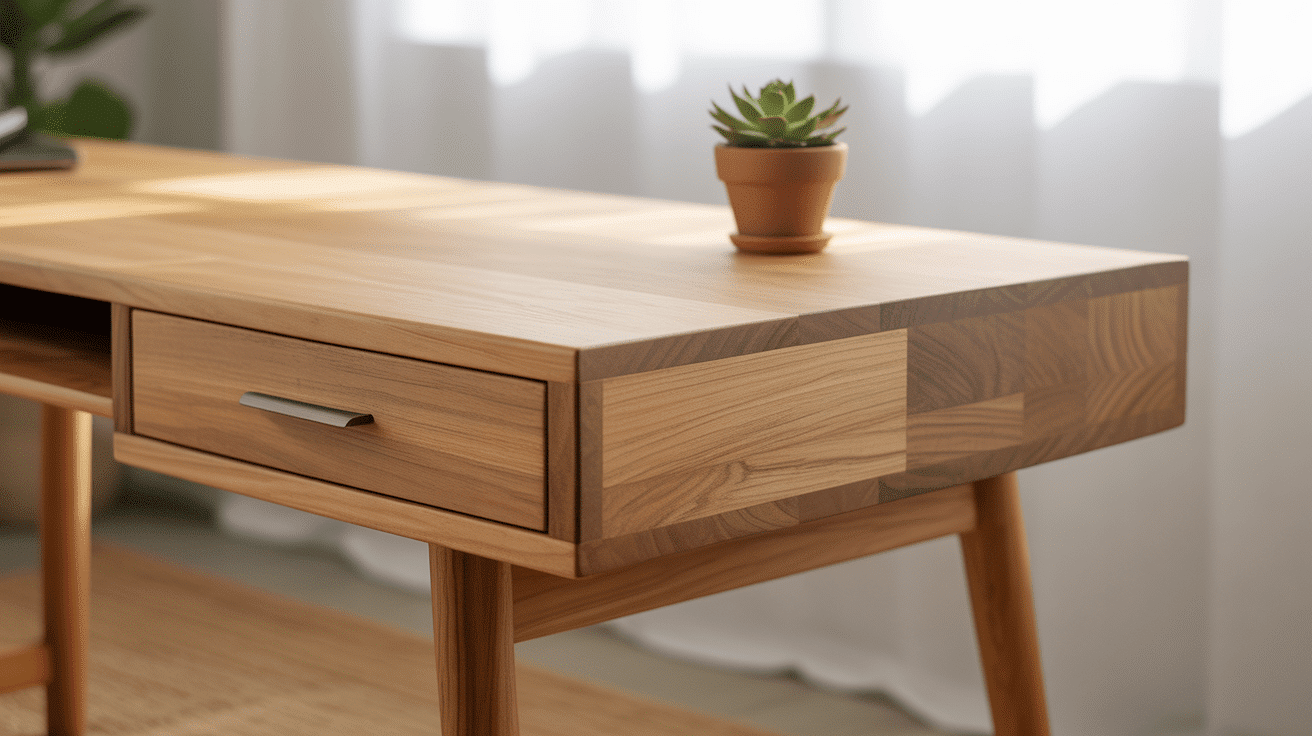
FSC-certified woods come from forests managed according to strict environmental, social, and economic standards. These responsibly harvested materials allow environmentally conscious professionals to enjoy traditional hardwoods without ecological concerns.
Many forward-thinking companies select FSC-certified materials for corporate workspaces to align furnishings with organizational values.
22. Cork Material
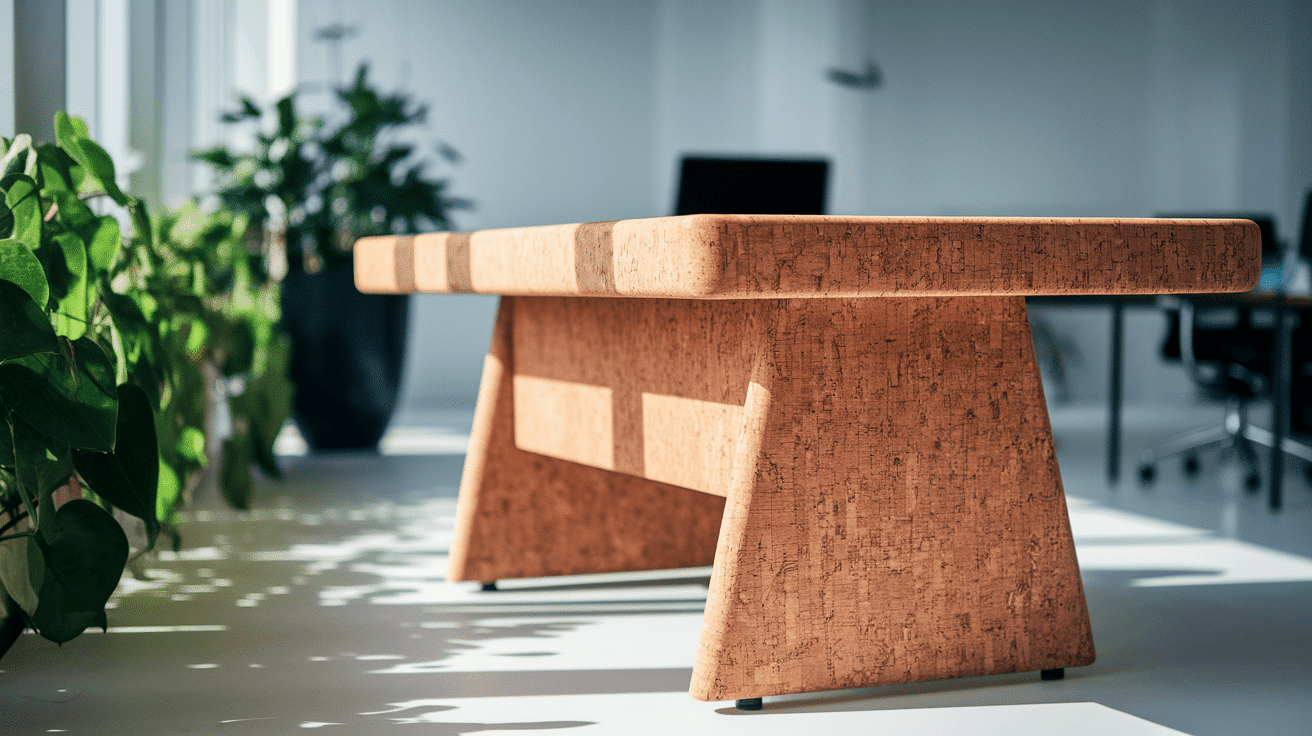
Cork offers remarkable sustainability as a harvested material that doesn’t require cutting down trees. This innovative desk surface provides natural sound dampening and a warm, tactile quality unlike any traditional hardwood.
Many health-focused professionals select cork for its hypoallergenic properties and its ability to create quieter, more comfortable work environments.
23. Engineered Wood
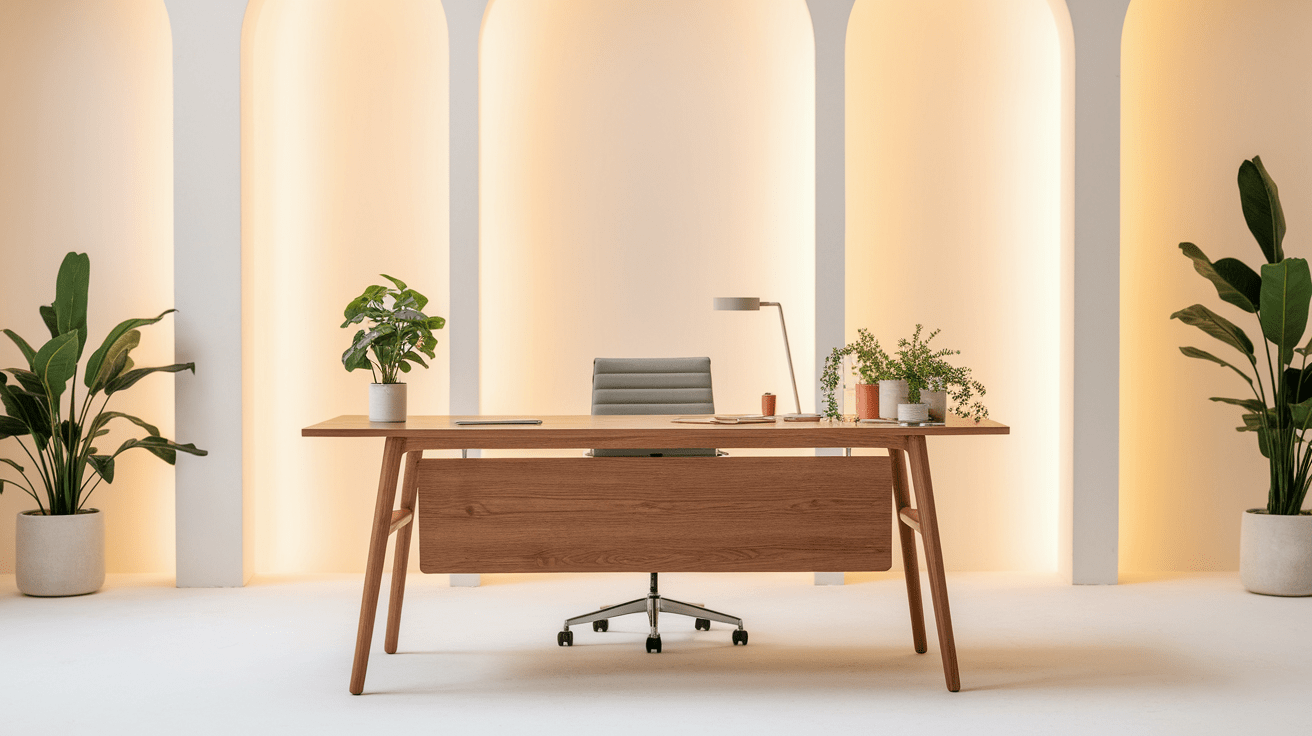
Engineered wood maximizes resource efficiency by utilizing fast-growing species and manufacturing techniques that minimize waste.
These innovative materials provide consistent performance without the environmental impact of harvesting old-growth forests.
These sustainable options demonstrate that responsible sourcing and production can create workspaces of lasting beauty, allowing you to make environmentally mindful choices without compromising on functionality or appearance.
What to Keep in Mind While Choosing Your Perfect Desk Wood?
When selecting your desk wood, these factors are must-consider to ensure you choose a truly eternal option:
- Your workspace style: Traditional offices often look best with medium to dark woods, while contemporary spaces can accommodate lighter tones.
- Room size and natural light: Lighter woods make smaller offices feel more spacious, while darker woods add coziness to larger spaces.
- Existing wood elements: Choose desk material that complements (not necessarily matches) existing wood trim, shelving, and furniture.
- Long-term work plans: Think about how your professional needs might evolve over time and choose a wood versatile enough to adapt.
- Lifestyle considerations: Darker woods show dust more readily, while medium tones tend to hide scratches and dents better.
Wrapping It Up
Tired of workspace disappointment? Your desk material choice today could be your productivity obstacle tomorrow. That’s why selecting the right wood matters more than following fleeting design trends.
Examine desks that retain appeal and functionality due to timeless materials. Rich walnut and versatile oak transcend office trends and seasonal changes, making them worthy investments that improve your work environment.
Ready to uncover the perfect wood that won’t leave you regretting your decision five years from now? These desk material options have stood the test of time for good reason.
Which of these eternal desk woods speaks to your professional style? Are you drawn to the warmth of cherry or the sophistication of dark walnut? Let us know in the comments below!

